Plenary Session 1: Moving Forward with Open, Flexible and Distance Learning (OFDL) in Southeast Asia
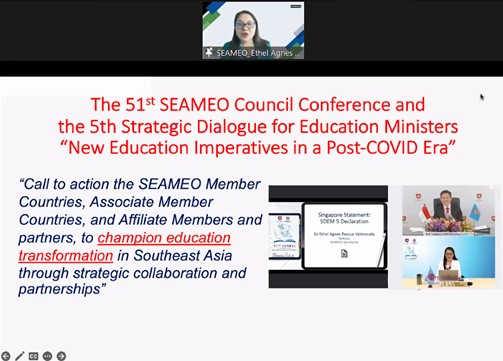
The 7th National Conference on Open and Distance e-Learning (NCODeL) had its first plenary session with Dr. Ethel Agnes Pascua Valenzuela, the Director of the Southeast Asian Ministers of Education Organization (SEAMEO) secretariat as the speaker. Her topic was Moving Forward with Open, Flexible, and Distance Learning (OFDL) in Southeast Asia. Dr. Valenzuela mentioned that OFDL refers to a type of education defined by openness and support of learning at a distance with its advantages being flexibility, accessibility, and most importantly, accessibility leading to its goal of reaching the most marginalized sectors.
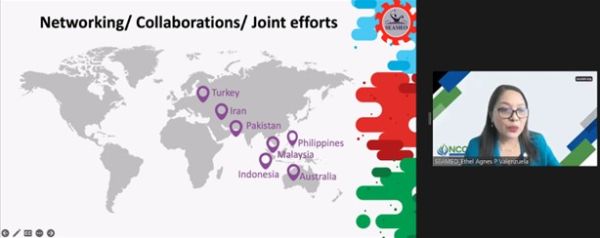
During the open forum, the efforts to include Special Education (SpEd) learners were discussed. Dr. Valenzuela mentioned the availability of different training, centers, and options when it comes to introducing SpEd learners in ODeL. Furthermore, she mentioned that SEAMEO has a center for SpEd based in Malaysia and that they have 3000 learners enrolled in the courses. In addition, the classes held are available in 8 different southeast Asian languages to cater to non-English speaking teachers and students. “There are endless possibilities… we have a lot of training programs and all of them are free,“ said Dr. Valenzuela. The session was facilitated by Dr. Sally Gutierez, Assistant Professor at University of the Philippines Open University (UPOU).
Plenary 2: Roadmapping the Transition to Flexible Modes of Education
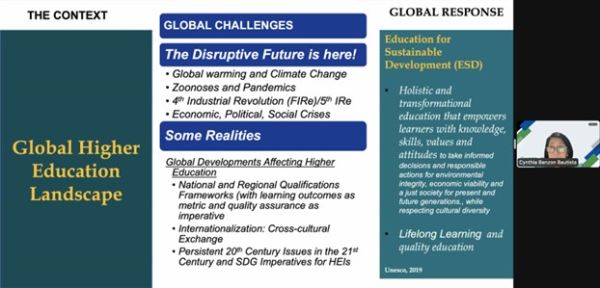
The secone plenary session was held with Dr. Maria Cynthia Rose B. Bautista, Vice President for Academic Affairs of the University of the Philippines as the speaker. Dr. Bautista focused on Roadmapping the Transition to Flexible Modes of Education. The session highlighted the importance of a dynamic educational system that is responsive and adaptable to the disruptions we encountered and we would all encounter, like the COVID-19 pandemic in the future. She also mentioned that as we enter the 4th and 5th industrial revolutions, so must the education system transition to help the learners not only cope but also thrive.
Paradigm shift considerations
According to Dr. Bautista, the paradigm shift in education started in the 90s. But today we have seen the global trend in the shift of learning and it is an individual process. “Individuals in this world of changes and disruptions would have to adapt to the requirements of the evolving labor market,” said Dr. Bautista.
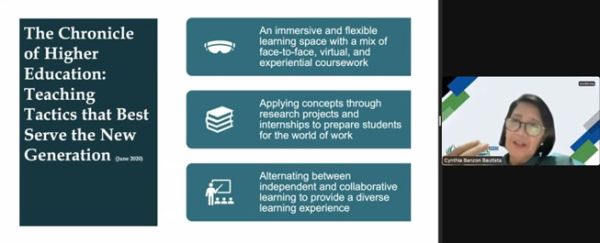
Moreover, Dr. Bautista laid out several considerations in roadmapping the transition to flexible modes of education. Some of them were:
- Grounded Envisioning of the Future – determining where we are going but starting from where we are;
- Curricular Review and Overhauling – includes General Education (GE) review, enhanced disciplinarity of courses;
- Organizational Review – ladderization of particular programs, mobile faculty across the Higher Educational Institution system, integration of reputable MOOCs; and
- Providing physical and academic infrastructure such as stronger internet connection and learning systems
Dr. Bautista ended the session by saying that the whole discussion on this paradigm shift started long ago. But towards 2018 there is an intensified need to work on changing pedagogies because of the challenges for the next generation. This session was facilitated by Assistant Professor Anna Katrina Marcial of UPOU.
Plenary Session 3: Micro-credentials Policies
The third plenary session with Dr. Borhene Chakroun, Director of the Division for Policies and Lifelong Learning Systems, of the United Nations Educational, Scientific and Cultural Organization (UNESCO) Education Sector, as the speaker, featured discussions on Micro-credentials Policies.
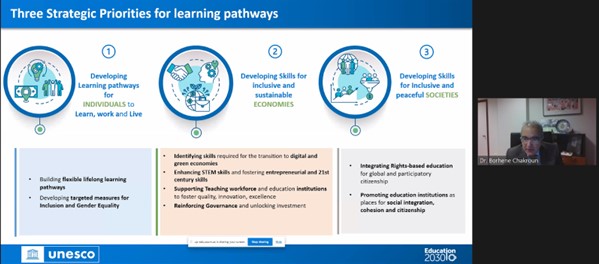
As the vision statement of the UNESCO Secretary General states, transforming education is an urgent political imperative for our collective future. In line with this, UNESCO identified three strategic priorities for learning pathways. These are developing learning pathways for individuals to learn, work and live; developing skills for inclusive and sustainable economies; and developing skills for inclusive and peaceful societies. Moreover, UNESCO proposed the following definitions for micro-credentials: it is a record of focused learning achievement verifying what the learner knows, understands, and can do; it is an assessment based on clearly defined standards and is awarded by a trusted provider; it has a stand-alone value and may also contribute to or complement other micro-credentials or macro-credentials through recognition of prior learning; and it meets the standards required by relevant quality assurance bodies. He also discussed the three key trends in micro-credentials which are national qualifications frameworks (NFQs) are being developed by 150 member states; regional and global conventions also aim to develop higher education qualifications; and digital representation tools are also being developed.

Dr. Chakroun also discussed the challenges of micro-credentials. He said that there is a question, if it will complement or replace full qualifications. Who will provide micro-credentials and can they be trusted? Quality assurance is needed, but how will it be conducted? It is also too soon to determine the evidence of its success because the phenomenon is very recent. In this fast-changing landscape, data security and privacy of learners and teachers should be protected. With all these challenges, UNESCO came up with the following policy recommendations: adopt a national policy framework for the promotion of short courses, micro-credentials, and flexible learning pathways; create a multi-actor learning ecosystem; develop comprehensive NQFs covering all learning provisions; set up the technological infrastructure for the digital storage of learning; ensure internal and external quality assurance; allocate resources to support course providers and learners; carry out accompanying action research; conduct international benchmarking and peer learning; develop digital transformation plans; and adopt regulatory frameworks for learners’ data privacy and protection. Dr. Chakroun also emphasized during the question and answer session that micro-credentials should meet the demand of the evolving labor market and more studies should be done on its impact on labor markets because empirical studies on micro-credentials are still limited. The session was facilitated by Dr. Sally Gutierez, Assistant Professor at University of the Philippines Open University (UPOU).
Written by the NCODeL Publicity Committee






